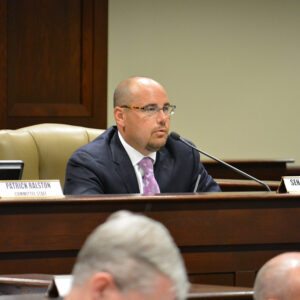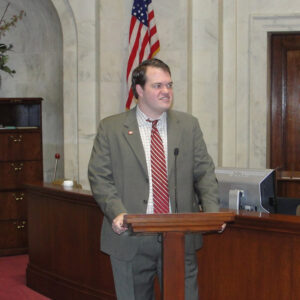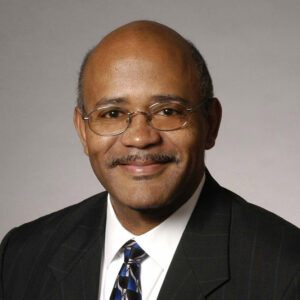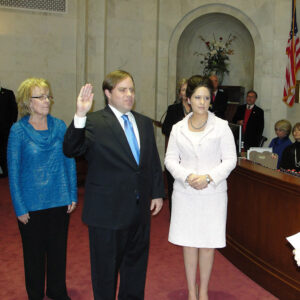calsfoundation@cals.org
General Improvement Fund
The General Improvement Fund was an account established by the Arkansas General Assembly in 1995 to allocate surplus state general revenues each year for capital improvement projects around the state. The fund, commonly called GIF, was a source of perpetual conflict for the governor, the Senate, and the House of Representatives, and it finally foundered after the Arkansas Supreme Court declared it unconstitutional three times and a number of legislators, lobbyists, and consultants were convicted on corruption charges over the spending.
Historically, when tax collections for state general revenues—which fund the public schools and most state services—exceeded the state budgets, the leftover money each year was directed to capital projects such as buildings, renovations, and equipment at colleges, universities, and other state institutions. The governor chose which of the legislature’s appropriations would actually be funded by the surplus. Toward the end of his twelve-year tenure, however, Governor Bill Clinton had the legislature divert virtually all the surpluses each year to the fund for public school operations.
Clinton’s successor in 1992, Governor Jim Guy Tucker, thought the state should have a permanent capital improvements program. In 1995, he offered tight state budgets for the next two years, which would assure surpluses that would be used to modernize facilities. The surpluses would go into the General Improvement Fund, and the governor once again would choose the legislature-approved projects that would be funded.
But Tucker was forced to resign in July 1996 after he was caught up in the Whitewater investigation of President Clinton and convicted of misapplying the proceeds of a bank loan in the 1980s. The lieutenant governor, Mike Huckabee, became governor and inherited the bounty in the growing GIF. Tucker was irritated by the prospect that Huckabee would take credit for all the improvements around the state, as were legislative leaders, including state senator Mike Beebe, who would succeed Huckabee as governor ten years later. After a public feud in the 1997 legislative session over who should control the fund, the legislature settled on a division: Huckabee would control half the surplus funds each year, and the legislature would control the other half.
That resolution did not end the strife over a treasury account that offered political dividends for every legislator. At the national level, it was called “pork barrel”—federally funded projects back in their congressional districts for which members of Congress could claim credit. State legislators at each session of the General Assembly introduced scores of appropriation bills for organizations and projects in their districts—volunteer fire departments, traffic signals, local museums, Boy Scouts, church schools, and even civic clubs. The two houses disputed who would determine which projects were funded, whether senators would get greater allocations than representatives, and in what order the projects would be funded. Eventually, they settled on a system that allocated to each of the 135 legislators a sum of money that he or she could manage for local projects of their choice. That arrangement was not written into the law but was commonly understood.
After the 2005 legislative session, Mike Wilson of Jacksonville (Pulaski County), a lawyer and former state representative, filed a lawsuit challenging the arrangement as a violation of Amendment 14 of the state constitution, which prohibited the legislature from passing local or special acts. In Wilson v. Weiss, Wilson, who represented himself, identified the appropriations for several central Arkansas projects—including his hometown library, which was administered by his brother-in-law—as acts that were local in nature and thus were unconstitutional. Twice, in 2006 and 2007, the case went to the Arkansas Supreme Court, and each time it declared appropriations for local projects unconstitutional.
Legislators then devised a scheme that they thought would get around the local-acts prohibition. At each biennial session, the legislature approved a number of appropriation bills directing millions of dollars from the GIF to each of the eight planning and development districts in the state, but the appropriation bills never mentioned specific local projects. The boards of the planning districts, typically composed of elected county and municipal officials, would designate projects to receive the money. The planning districts were created when Congress passed the Public Works and Economic Development Act of 1965, which was part of President Lyndon B. Johnson’s “Great Society.” The planning districts were to be conduits for federal, state, and private assistance for projects that stimulated economic growth in the counties, including job training, services for the aged, and rural waste management.
The arrangement began to fall apart in 2015 when state representative Karen S. Hopper of Mountain Home (Baxter County) asked the state Legislative Audit Division to investigate how the Northwest Arkansas Development District, which served nine counties, had spent its GIF allocations and other grant funds over the previous ten years. The planning district’s last audit by a private accounting firm had declared all its activities clean. The legislative audit was not as laudatory, however. It found that the agency had improperly commingled funds from various accounts and frequently misspent money from the GIF and other accounts. It had transferred $636,900 from the GIF appropriation to federally supported aging programs in order to pay an overdue debt to a wholesale grocer in Springfield, Missouri. The GIF money was supposed to be used exclusively for “economic development” projects identified by senators and representatives. The audit showed that the district had sent $11,339,674 in 2013 and 2014 to local groups that were designated by legislators. They had the planning district send $592,500 to a tiny Bible college called Ecclesia College, outside the town of Elm Springs (Washington and Benton counties), although the Arkansas Constitution seemed to prohibit state appropriations to religious institutions.
A Freedom of Information Act (FOIA) request by the Arkansas Times produced internal documents that showed how the GIF money was distributed. Each legislator had a code number like S-15 or H-60, which reflected the number of the senator’s or representative’s district, and an allotment of money. Each legislator instructed the planning district by emails, telephone, or memoranda where his or her allotment was to go. The planning board then would approve each expenditure and notify the recipients which legislators they should thank for the money. Each of the eight planning districts in the state apparently devised its own system for managing the allocations.
The audit attracted little attention at first, although the Arkansas Times questioned allocations for the obscure Bible college from a dozen legislators from the area. However, the audit was turned over to federal law enforcement agencies, which for the next three years brought fraud charges against legislators, lobbyists, and private consultants who were implicated in the illegal diversion of GIF and state and federal Medicaid funds.
Prosecutors first focused on state senator Jon Woods of Springdale (Washington and Benton counties), a Republican legislative leader who had rounded up the legislative gifts to Ecclesia College from fellow legislators and who had arranged or received monetary kickbacks, but the audit and the federal investigation also led prosecutors to other fraudulent schemes involving legislators and lobbyists posing as consultants for groups seeking state funds.
In May 2018, a federal jury convicted Woods on fifteen counts of fraud and conspiracy by steering money to Ecclesia College and to other groups in exchange for kickbacks. A lobbyist who conspired with him, Randall Shelton Jr., was convicted at the same trial. Representative Micah Neal of Springdale pleaded guilty to conspiring with Woods to send tax money to the college and to a private nonprofit firm that provided Medicaid behavioral health services to people in several states. The president of the Bible college, Oren Paris III, pleaded guilty to making kickbacks to Woods, Neal, and a lobbyist who guided state funds to groups that employed him as a consultant. A former state senator who became Governor Asa Hutchinson’s chief of staff, Michael Lamoureux, acknowledged designating $60,000 of GIF funds to the college from another planning district, although no illegality was attached to the deal.
The GIF audit led investigators to lawmakers and consultants who conspired to direct state and federal Medicaid funds to Preferred Family Healthcare, a multistate, nonprofit company based in Springfield, Missouri, which was reimbursed $43 million for providing behavioral health services. Rusty Cranford—a lobbyist, consultant, and employee of the nonprofit—pleaded guilty to conspiring with legislators through bribes and kickbacks to make the company eligible for more state aid. Former state representative Eddie Wayne Cooper of Melbourne (Izard County), by then working as a consultant, pleaded guilty to conspiring with executives of the company to use Medicaid funds for unlawful political gifts and lobbying. He received over $387,000 for lobbying and $63,000 in kickbacks. Another lobbyist and employee of the company, Milton Russell, pleaded guilty to using bribes and kickbacks to legislators to help the nonprofit obtain more state Medicaid funding. One scheme involved state senator Jeremy Hutchinson, a nephew of Governor Hutchinson. Senator Jake Files of Fort Smith (Sebastian County) pleaded guilty to money laundering, wire fraud, bank fraud, and using GIF receipts for his personal benefit. Representative Henry Wilkins of Pine Bluff (Jefferson County) pleaded guilty to accepting kickbacks for designating GIF funds for the healthcare nonprofit; he began serving his one-year-and-one-day federal prison sentence in May 2023.
Mike Wilson, acting for the Arkansas Public Law Center, filed another lawsuit against the state in 2016, arguing that the state continued to violate the local-and-special-acts prohibition. Although the audit of the northwest Arkansas planning district triggered his suit, Wilson based his challenge on projects in the Central Arkansas Development District, which used a similar system for identifying legislators’ projects to fund. The Arkansas Supreme Court ruled that the legislature’s circuitous method of funding local projects was unconstitutional, the same as its direct appropriations had been.
Governor Hutchinson recommended in 2017 that the legislature not renew the GIF funding system, and it did not.
For additional information:
“Corruption Scandal Ensnares 5 Ex-Lawmakers, So Far.” Arkansas Democrat-Gazette, November 4, 2018, pp. 1A, 10A.
Dumas, Ernest. “Follow the Money to Ecclesia, etc.” Arkansas Times, December 24, 2015, pp. 7, 36.
Investigative Report: Review of Selected Policies, Procedures and Transactions, Northwest Arkansas Economic Development District For the period January 1, 2005 through December 31, 2014. Little Rock: Arkansas Legislative Audit, 2015.
Monk, Ginny. “Ex-Lawmaker Pleads Guilty to Doling Favors for Bribes.” Arkansas Democrat-Gazette, May 1, 2018, pp. 1, 3.
Thompson, Doug. “Grants’ Size 1st Thread Pulled in Unravelling Corruption.” Arkansas Democrat-Gazette, November 4, 2018, pp. 1A, 10A–11A.
———. “Lobbyist Plea Deal Describes Give, Take.” Arkansas Democrat-Gazette, June 10, 2018, pp. 1, 10.
_____. “Woods Guilty in Kickback Schemes.” Arkansas Democrat-Gazette, May 4, 2018, pp. 1, 2.
Thompson, Doug, and Perozek, Dave. “Plea Cites ‘Senator A’ Payoffs.” Arkansas Democrat-Gazette, June 8, 2018, p. 1, 3.
Thompson, Doug. “Woods’ Prison Term 18 Years in Graft Case.” Arkansas Democrat-Gazette, September 6, 2018, pp. 1A, 3A.
Wood, Ron, and Doug Thompson. “GIF Kickbacks Cases Still Grinding through Courts.” Arkansas Democrat-Gazette, November 22, 2020, p. 8A.
Ernest Dumas
Little Rock, Arkansas
 Divergent Prosperity and the Arc of Reform, 1968–2022
Divergent Prosperity and the Arc of Reform, 1968–2022 Politics and Government
Politics and Government Jeremy Hutchinson
Jeremy Hutchinson  Michael Lamoureux
Michael Lamoureux  Hank Wilkins
Hank Wilkins  Jon Woods
Jon Woods 




Comments
No comments on this entry yet.